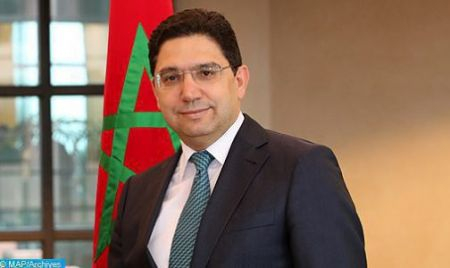FM Reaffirms Morocco’s Continued Commitment to Promoting Democracy
Minister of Foreign Affairs, African Cooperation and Moroccans abroad, Nasser Bourita, reiterated Morocco’s continued commitment “to promoting democracy and strengthening its resilience”. Speaking at the 10th Ministerial Conference of the Community of Democracies, held virtually Wednesday on the sidelines of the 76th General Assembly of the United Nations, Bourita stressed that Morocco, “as a partner of this Community, remains committed to promoting democracy and strengthening its resilience, while supporting adherence to common democratic values, human rights and the rule of law, as stated in the Warsaw Declaration”. “Under the leadership of HM King Mohammed VI, Morocco itself is actively engaged in a solid process of democratization, as part of the Kingdom’s long trajectory of reforms,” he recalled. In this regard the minister highlighted the adoption this year of the New Development Model which aims to achieve the full potential of the country, with the ambition of entrenching democracy to enable citizens to take charge of their lives and their future within an “open, diverse, fair and equitable” society. “For Morocco, resilience and democracy go hand in hand. In fact, the reforms implemented by HM the King have continued, despite the pandemic crisis,” said Bourita, explaining that these reforms have been reinforced with bold initiatives such as the launch of the generalized social coverage system. Also, he added, “and despite a tumultuous context for democracy at the regional level and the challenges posed by a persistent pandemic, the democratic vitality of the Kingdom was clearly demonstrated in the general elections” of September 8, noting that the voter turnout exceeded 50%, reaching more than 60% in the Moroccan Sahara Provinces. In this context, Bourita noted that the international community has congratulated Morocco for the success of these elections, organized with the presence of 4,323 civil society organizations, and 152 international election observers, which further strengthened the guarantees of transparency and integrity. In addition to “essential” democratic principles and practices such as free and fair elections, the minister stressed, in particular, the Kingdom’s inclusive approach to civil society as a factor that characterizes Moroccan society. “In Morocco, the fabric of civil society has never been so dense,” noted the diplomat, recalling that the Constitution of 2011 has given it a “very important” advisory role, but also as a catalyst for development. In addition, the minister said that for Morocco, the consolidation of democracy and the strengthening of its resilience require to guarantee citizens not only their fundamental rights, but also a healthy and prosperous living environment, in security, stability and harmony. In this regard, the minister highlighted the commitment and commendable initiatives of the Kingdom, including the fight against terrorism and religious extremism, migration, environmental action and the fight against climate change. “The clear support of the international community to the strategic and irreversible choices of Morocco are not the result of chance,” stressed Bourita, explaining that the Kingdom has made “the deepening and strengthening of democratic practices one of the priorities of its national agenda and its international commitments”.

